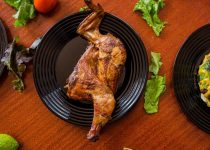Will Rotisserie Chicken Dog Food Sick
Hey there, pet parent! Feeding your furry friend like giving them a taste of the forbidden fruit, isn't it? You've probably wondered if feeding them some of that delicious rotisserie chicken could be a risky move. Well, let's chat about the potential risks and benefits of incorporating rotisserie chicken in your dog's diet.
But before you start worrying, there are some safe ways to do it – and we'll get to those, too. So, is it a recipe for disaster or a delightful treat? Stick around to find out.
Potential Risks of Rotisserie Chicken for Dogs
While rotisserie chicken may seem like a tasty treat for your canine companion, it's important to be aware of the potential risks it can pose to their health. Despite being a delicious and convenient option, there are several precautions to consider when feeding your dog rotisserie chicken.
One of the main risks is that these chickens are often seasoned with ingredients like garlic and onion, which can be toxic to dogs. Additionally, the high sodium content in rotisserie chicken can lead to dehydration and other health issues for your furry friend.
Another risk to be mindful of is the potential for bones in rotisserie chicken. The bones can splinter and pose a choking hazard or cause internal injuries. Moreover, the skin of rotisserie chicken is often seasoned with various spices and herbs that mightn't sit well with your dog's digestive system, leading to gastrointestinal problems.
To mitigate these risks, it's crucial to remove the skin and bones from the chicken before feeding it to your dog. Opt for plain, unseasoned chicken meat as an occasional treat, and ensure it's thoroughly cooked to avoid any harmful bacteria. By taking these precautions, you can safely incorporate rotisserie chicken into your dog's diet while minimizing potential risks to their health.
Benefits of Feeding Rotisserie Chicken to Dogs
Feeding your dog small amounts of plain, unseasoned rotisserie chicken can offer a protein-packed and flavorful addition to their diet. Here are some reasons why incorporating rotisserie chicken into your dog's meals can be beneficial:
- Nutritional benefits: Rotisserie chicken is a great source of lean protein, which is essential for muscle development and overall health. It also contains important nutrients like vitamins B6 and B12, niacin, and minerals such as iron and zinc.
- Cooking methods: When preparing rotisserie chicken for your dog, it's important to avoid seasoning, as certain herbs and spices can be harmful to dogs. Stick to simple cooking methods like roasting or boiling to retain the natural flavors and nutrients.
- Health considerations: While rotisserie chicken can be a healthy addition to your dog's diet, it's crucial to practice portion control. Too much chicken can lead to an unbalanced diet and potential weight gain. Additionally, always remove the bones before feeding the chicken to your dog to avoid choking hazards.
- Portion control: Introduce rotisserie chicken gradually into your dog's diet and monitor how they respond. It's recommended to consult with a veterinarian to determine the appropriate portion size based on your dog's size, age, and activity level.
Safe Ways to Incorporate Rotisserie Chicken in Your Dog's Diet
To safely incorporate rotisserie chicken into your dog's diet, it's important to focus on simple cooking methods and mindful portion control to maintain their overall health and well-being. When it comes to nutritional value, rotisserie chicken is a great source of lean protein, vitamins, and minerals for your furry friend. However, it's crucial to remove the skin and bones before feeding it to your dog to prevent any digestive issues or choking hazards.
Additionally, consider adding the chicken to your dog's regular meal portions rather than as a standalone meal to ensure a balanced diet. As for the feeding schedule, moderation is key. You can introduce small amounts of rotisserie chicken into your dog's diet a few times a week, depending on their size and dietary needs. Remember that treats and additional food shouldn't exceed 10% of your dog's daily caloric intake.
Always consult with your veterinarian to determine the ideal amount of rotisserie chicken that can be incorporated into your dog's diet based on their individual requirements. By following these guidelines, you can safely add rotisserie chicken to your dog's meals, providing a tasty and nutritious addition to their diet.
Signs of Illness in Dogs After Eating Rotisserie Chicken
If your dog exhibits any unusual symptoms or behaviors after consuming rotisserie chicken, it's important to monitor them closely and seek veterinary attention if necessary.
Here are some signs of illness in dogs after eating rotisserie chicken:
- Vomiting or Diarrhea: Keep an eye out for frequent vomiting or diarrhea, as this could indicate gastrointestinal distress.
- Lethargy: If your dog seems unusually tired or lacks energy after consuming rotisserie chicken, it could be a sign of illness.
- Loss of Appetite: A sudden disinterest in food or refusal to eat could be a red flag that something isn't right.
- Abdominal Discomfort: Watch for signs of discomfort such as whining, restlessness, or a tense abdomen.
If you notice any of these symptoms, it's crucial to consult with your veterinarian promptly. Treatment options may include supportive care to alleviate symptoms, such as administering fluids to prevent dehydration, and in severe cases, medication to address any underlying issues. Your vet will guide you on the best course of action based on your dog's specific symptoms and overall health.
Tips for Choosing and Preparing Rotisserie Chicken for Dogs
When choosing rotisserie chicken for your dog, ensure that it's plain, unseasoned, and free from any potentially harmful additives or flavorings. Proper seasoning is key when selecting rotisserie chicken for your furry friend. The seasoning and flavorings added to some rotisserie chickens can upset your dog's stomach or even be toxic to them. Opt for plain, unseasoned rotisserie chicken to keep your pup safe and healthy.
In addition to proper seasoning, bone safety is crucial when preparing rotisserie chicken for your dog. While dogs love bones, cooked bones, including those in rotisserie chicken, can splinter and cause serious internal injuries. Therefore, it's essential to remove all bones from the chicken before feeding it to your dog. This simple step can prevent choking, digestive issues, and potential harm to your pet.
When preparing rotisserie chicken for your dog, take the time to ensure it's free from seasoning and bones. By following these tips, you can safely incorporate rotisserie chicken into your dog's diet and treat them to a delicious and nutritious meal.
Frequently Asked Questions
Can Rotisserie Chicken Be Used as a Primary Source of Nutrition for Dogs?
Yes, rotisserie chicken can be a part of homemade dog food, but it shouldn't be the primary source of nutrition. Canine nutrition requires a balanced diet, so it's best to mix in raw food or commercial dog food.
Are There Specific Breeds of Dogs That Should Avoid Eating Rotisserie Chicken?
If your dog has specific dietary restrictions or health concerns, it's best to consult with a vet before feeding them rotisserie chicken. Certain breeds may have trouble digesting it, so it's important to be cautious.
Can Dogs Safely Eat the Skin and Bones of Rotisserie Chicken?
You should avoid giving your dog the skin and bones of rotisserie chicken as they pose potential hazards like choking or intestinal blockage. Instead, consider making homemade dog-friendly recipes using plain, unseasoned chicken.
What Are the Potential Long-Term Effects of Feeding Rotisserie Chicken to Dogs?
Feeding rotisserie chicken to dogs can lead to potential risks like dietary imbalance, obesity, and pancreatitis. It's important to maintain a balanced diet and limit human food to occasional treats for your pup's health.
Are There Any Alternative Cooking Methods for Chicken That Are Safer for Dogs?
When cooking chicken for your dog, consider safer methods like boiling or baking. Avoid raw diets, as they can pose health risks. It's important to ensure the meat is thoroughly cooked to prevent any potential harm to your furry friend.



